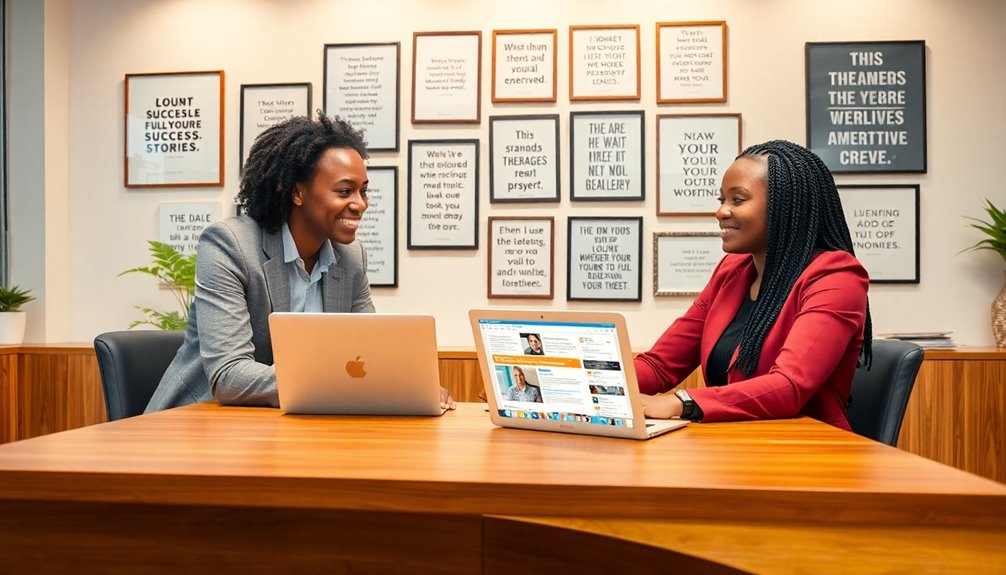Getting 1-on-1 coaching can transform your job search by providing personalized guidance tailored to your unique strengths and weaknesses. You'll enhance your skills with structured sessions that keep you focused and accountable. This support not only boosts your motivation but also improves your overall job performance. With targeted strategies, you'll learn to network effectively and present yourself confidently to potential employers. Ultimately, this approach reveals endless job opportunities you may not have considered. Stick around to discover how the right coaching can elevate your career prospects and lead to more job offers than you ever imagined!
Key Takeaways
- Personalized coaching identifies your strengths and weaknesses, aligning your skills with job market demands for more job offers.
- Structured sessions focus on enhancing essential skills like communication and networking, crucial for standing out to employers.
- Ongoing support and accountability keep you motivated, ensuring consistent progress towards your job search goals.
- Effective networking strategies, including LinkedIn optimization and industry event participation, expand your reach to potential job opportunities.
- Tailored job search strategies and resources increase your chances of finding openings that match your career aspirations.
Benefits of One-on-One Coaching

One-on-one coaching offers numerous benefits that can greatly enhance your career journey. With personalized guidance, you'll find the motivation and accountability you need to achieve your goals. You won't have to worry about distractions that often come with group settings, allowing you to focus entirely on your development. Regular coaching sessions reinforce your commitment, helping you stay on track and combat the Ebbinghaus Forgetting Curve, so your learning stays fresh. Additionally, this coaching helps you build personal awareness. By identifying weaknesses and leveraging strengths, you can make informed decisions that guide your career. You'll focus on self-awareness and self-management, fostering self-improvement and self-motivation that lead to significant personal growth. Moreover, one-on-one coaching is essential for skill development. It tailors support to enhance specific skills like communication and conflict management, leading to improved work performance and team effectiveness. This focused approach doesn't just boost your professional capabilities; it also enhances your overall job satisfaction. The coaching relationship emphasizes skill building can improve efficiency and direction in your career. Embracing the benefits of one-on-one coaching can truly reveal endless job offers, setting you on a path to success in your career.
Personalized Guidance and Support

Effective personalized guidance and support can make a significant difference in your job search journey. When you work with certified professionals, you gain insights tailored specifically to your career goals. The coaching process often includes structured sessions via webinars or Zoom, ensuring that your time is used effectively. Additionally, one-on-one coaching sessions led by AIRS Certified professionals provide focused attention on your unique needs. By leveraging data-driven decision-making, you can refine your approach to job searching based on your preferences and market trends.
Your sessions focus on strategies that are unique to you. Here's how personalized guidance breaks down:
| Key Elements | Your Benefits |
|---|---|
| Tailored Job Strategies | Aligns with your career aspirations |
| Resume and Cover Letter Support | Enhances your personal branding |
| Interview Preparation | Boosts your confidence and performance |
| Ongoing Support | Keeps you motivated and on track |
Along with unlimited email support after each session, you'll receive assistance in finding job opportunities. Regular check-ins help you track progress and adjust your strategies as needed. With personalized guidance, you're not just another candidate; you're poised for success, overcoming barriers and maintaining a positive mindset throughout your journey.
Skill Development and Improvement

Skill development is essential for standing out in today's competitive job market. To enhance your skills effectively, you need to adopt a structured approach that focuses on continuous improvement. Here are three key strategies to contemplate:
- Deliberate Practice: Break down your skills into smaller parts and set SMART goals for each area. Create a structured routine that targets your weak points, continuously challenging yourself as you practice. Remember to remove competition from teaching as it can hinder your skill development.
- Effective Scheduling: Work in short bursts to maintain your attention and avoid burnout. Spread your practice over several sessions instead of cramming, and establish a consistent schedule that fits your lifestyle. Remember, consistency trumps duration.
- Embrace Feedback: View failures as opportunities for growth. Analyze what went wrong and adjust your approach accordingly. Don't hesitate to seek feedback from others, as it can guide you in refining your skills.
Increased Engagement and Motivation

A thriving workplace culture can greatly boost engagement and motivation among employees. When you're part of an engaged workforce, you'll find that companies experience a 21% increase in profitability and a 17% rise in productivity. This isn't just good news for the business; it directly impacts your experience at work. Companies with strong cultures achieve over four times higher revenue growth, creating an environment where you can thrive. Additionally, fostering a culture of continuous learning can enhance employee engagement and innovation.
Effective internal communication plays a vital role, motivating 85% of employees like you to stay connected and informed. Recognition is essential too—37% of people consider it the most important motivator. When you feel appreciated, you're 68% less likely to experience burnout. Furthermore, high engagement levels are linked to increased productivity, which enhances your overall work experience.
Engagement also leads to lower staff turnover, with engaged employees reducing turnover rates by 18%. This means you get to work alongside colleagues who are equally committed and passionate about their roles. Additionally, your efforts can enhance customer retention and spark innovation within the company.
In a landscape where only 30% of U.S. employees are engaged, fostering a culture that prioritizes motivation can dramatically enhance not just your job satisfaction, but also your overall performance.
Effective Coaching Sessions

Coaching sessions thrive on structure and focus, ensuring you make the most of your time together. To maximize the effectiveness of each session, consider these key strategies:
- Set Outcomes Early: Clearly define what you want to achieve in the session. This not only involves you in the process but also helps track your improvements over time.
- Utilize Various Coaching Tools: Different techniques cater to your unique needs. For instance, use the Wheel of Life to assess various life aspects or the Eisenhower Matrix for prioritizing tasks. Mastery in coaching combines creativity with systematic approaches, allowing for more personalized and effective coaching experiences.
- Engage in Meaningful Conversations: Open-ended questions can lead to self-reflection and deeper insights. By guiding yourself through the Socratic method, you'll uncover underlying beliefs that may be holding you back.
Outcomes and Results

While pursuing job offers, understanding the outcomes and results of one-on-one coaching can greatly impact your career trajectory. You'll experience increased engagement and motivation through personalized guidance and support. This tailored approach enhances accountability, ensuring you stay focused on your individual needs and goals, which ultimately aligns better with your career aspirations. Additionally, being aware of small mistakes during your coaching journey can lead to significant improvements in your overall performance and development.
Moreover, coaching fosters significant personal and professional growth. You'll identify weaknesses and enhance your self-awareness, improving your decision-making skills. As you develop your leadership style, your communication, delegation, and conflict management skills will also improve, boosting your confidence and self-resilience. In this supportive environment, the strong trusting relationship built during coaching sessions encourages open discussions that further enhance your growth.
In terms of skill development, coaching provides targeted support for essential skills like communication and team building. You'll see noticeable improvements in your work performance and job satisfaction, thanks to the personalized coaching relationships and tools available.
Finally, the long-term outcomes and ROI are impressive. With a 99% satisfaction rate among clients and a median coaching ROI of seven times the investment, you can expect significant positive effects on your cognitive outcomes and employment prospects. This journey of continuous learning and personal development will set you on a path towards success.
Unlocking Job Opportunities

To access job opportunities effectively, you need to adopt a strategic approach that combines networking, leveraging online resources, and personal branding. By focusing on these areas, you'll reveal a world of possibilities that can lead to your dream job.
Here are three key strategies to implement:
- Network Strategically: Attend industry events, join professional associations, and leverage platforms like LinkedIn to connect with professionals in your field. Don't hesitate to reach out to friends or former colleagues for job leads and advice. Additionally, consider exploring unconventional networking venues to meet diverse professionals and expand your connections.
- Leverage Online Resources: Use job search sites like Indeed and LinkedIn to find openings. Set up job alerts tailored to your preferences, and explore niche job platforms for more specific opportunities.
- Enhance Your Personal Brand: Create a personal website or digital portfolio to showcase your unique skills and experiences. Update your resume and LinkedIn profile with relevant keywords to boost visibility and attract potential employers.
Frequently Asked Questions
How Long Does a Typical Coaching Session Last?
A typical coaching session lasts between 30 to 60 minutes. This duration lets you engage in various topics without feeling rushed. You can celebrate your victories, ask quick questions, and set intentions within this timeframe. If you need something shorter, laser sessions are available, lasting 10 to 20 minutes, focusing on specific issues. Alternatively, longer sessions of two hours or more can help explore complex situations in depth, tailored to your needs.
What Qualifications Should a Coach Have?
When you're maneuvering the job market, a coach should be your compass. Look for someone with relevant certifications, like APSE or ARCE, and training in vocational rehabilitation. They should have hands-on experience working with people with disabilities and strong interpersonal skills. Effective communication is key, along with the ability to set achievable goals. A good coach will motivate you, helping you turn challenges into stepping stones toward success.
Can Coaching Be Done Virtually?
Yes, coaching can definitely be done virtually! You'll find that online coaching provides flexibility and access to exceptional coaches worldwide. Many participants report significant improvements in their performance and communication skills through virtual sessions. The use of technology enhances engagement, allowing for interactive discussions and real-time feedback. Plus, it often saves time compared to traditional face-to-face coaching. So, you can easily fit coaching into your busy schedule and still achieve great results!
How Do I Measure My Coaching Progress?
To measure your coaching progress, start by setting S.M.A.R.T. goals that align with your aspirations. Regularly assess your achievements through self-reflections and feedback from others. Use tools like rating scales or psychometric assessments to track tangible outcomes. Additionally, monitor milestones and adjust your objectives based on your development. Stay proactive in seeking feedback to guarantee you're on the right path and making meaningful progress towards your goals.
Is 1-On-1 Coaching Suitable for All Career Levels?
You might think 1-on-1 coaching is only for executives, but it's actually valuable at every career level. Whether you're a people manager honing your skills, an individual contributor aiming for promotion, or simply seeking personal growth, coaching provides tailored support. It helps you navigate challenges, set goals, and enhance overall performance. Investing in coaching can lead to significant professional and personal development, no matter where you are in your career journey.
Conclusion
Don't worry if you think one-on-one coaching is too time-consuming or expensive; investing in yourself now can lead to countless job offers down the line. With personalized guidance, you'll develop the skills and confidence needed to stand out in today's competitive job market. Imagine walking into interviews knowing you're fully prepared. By releasing your potential, you're not just finding a job—you're building a fulfilling career. Start your journey today and watch the opportunities unfold!









